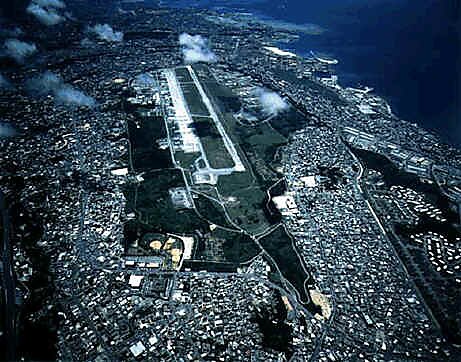Two weeks ago in Defense News, I argued that America’s alliances are growing increasingly detached from American security interests. With reference to Defense Secretary Bob Gates’ visit to the newly-minted government in Japan, I wrote that
after imploring [new Japanese PM Yukio] Hatoyama to continue Japan’s minuscule contribution to the war in Afghanistan and not to reconsider the deal to realign U.S. forces in Japan, Gates was asked whether the U.S. military role in Japan might be scaled back. Offering the obligatory reference to the countries’ “shared interest” in regional security, Gates admitted that “the primary purpose of our alliance from a military standpoint is to provide for the security of Japan … It allows Japan to have a defense budget … of roughly 1 percent of GDP.”
This is an excellent reason why the Japanese should support the alliance, but it raises the question of why U.S. taxpayers should want to pick up the tab for Japan’s security.
[caption align=right]
MCAS Futenma[/caption]
But the Hatoyama government seems intent on reopening old wounds. Aside from its insistence on renegotiating the Futenma agreement on shifting US forces around in Japan, now comes the news that the just-elected Democratic Party (DPJ) is going to (*ahem*) open the kimono and reveal “evidence of a decades-old secret pact between Tokyo and Washington that allowed U.S. ships and aircraft to carry nuclear weapons on stopovers in Japan.”
The idea of a Japanese government breaking Japanese law in order to allow American military vessels to carry nuclear weapons in Japan is wildly unpopular among Japanese. In large part, this is a pretty transparent move by the DPJ to stick it to the now out of power Liberal Democratic Party (LDP) by tying them to illegal and secretive practices that huge majorities of the Japanese public oppose.
But the broader point is that for those of us who have been advocating a larger role in Asia for Japan and a smaller one for the United States, the increasingly independent nature of the new DPJ government ought to be seen as a feature, not a bug. If the Japanese are really feeling their oats and aren’t too excited at continuing the LDP’s lockstep alliance with the United States, more power to them. If they want fewer US troops in Japan, terrific. We’re militarily overextended as it is and have serious economic problems to deal with. The Bush administration took some baby steps in this direction. The Obama administration should keep the ball rolling.
American officials ought to be quietly thinking about how to use the developments in Japan to start handing off responsibility for defending Japan to the Japanese government.

